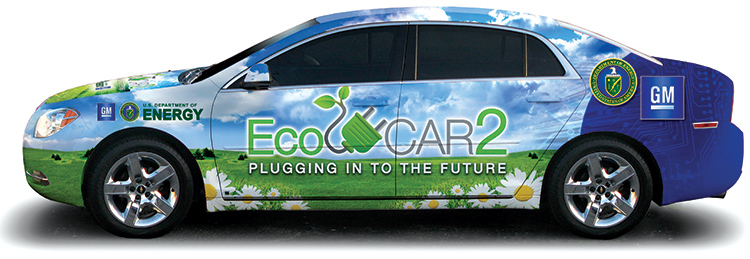UW students compete to create the world’s greenest car

Imagine making a 50-mile commute in a Chevy Malibu that is using its electric motor, then shifting into its hybrid diesel engine for another 400 freeway miles—all on one tank of fuel.
Sound too good to be true? Not if the UW EcoCAR 2 team has its way. More than 40 UW students from a variety of disciplines are building a car for the future as part of the EcoCAR 2 competition, an international contest sponsored by the U.S. Department of Energy and General Motors Co. It is a three-year college engineering competition in which 15 universities work to reduce the environmental impact of a Chevy Malibu.
The UW competed with hundreds of schools across the country to be selected as an EcoCAR 2 team. Each team received $25,000 from the two sponsors, and the UW team was given another $25,000 by the UW Department of Mechanical Engineering.
Trevor Fayer and Trevor Crain, first-year master’s students in mechanical engineering, wrote the UW proposal and are driving the technical aspects of the project. While students from various engineering disciplines are handling the project’s technical aspects, students from the Foster School of Business and other parts of the university are getting real-world experience doing website work, graphic design, presentation preparation, community outreach and fundraising.
Each of the 15 teams will work on the same model of Chevy Malibu. (The UW team’s car will be delivered this month.) The students will strip out the drive train and motor and replace them with their own fuel-efficient, low-emission design. “Our vehicle is a different kind of hybrid,” Crain explains. “The way it works is, the front axle can operate under diesel-engine power alone. And on the rear, we have electric power. The only connection is through the road. We can drive completely on electric power or completely on diesel.”
Although teams from different universities are competing for the grand prize, Fayer says the work is more collaboration than competition. “If one university is having a problem, it’s not bad form to call another school and troubleshoot or get tech support. We all want to work together and get each other’s cars running,” he says.
Each team has to complete a series of milestones and there are five-day workshops in which the teams come together, show their designs and get reviewed by their industry partners. The teams are receiving a large number of sophisticated computational tools given by the sponsors.
Brian Fabien, the engineering professor who is advising the UW team, says there is something special that sets the UW effort apart: “We belong to a community and a culture that values the environment and that drives all of our engineering decisions.”
At the end of the three-year process, cars will be judged on emissions, consumer appeal and fuel efficiency, and a winner selected. “This is just the beginning. Our goal is advanced vehicle technology at the UW,” Fabien says. “This will be a legacy to the university.”